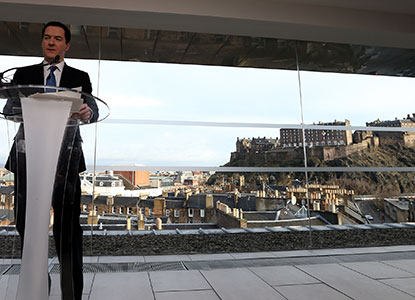By Richard Johnstone | 13 February 2014
Chancellor George Osborne has ruled out a currency union between Scotland and the rest of the UK in the event of a Yes vote in September’s independence referendum.

In a speech in Edinburgh today, Osborne said an independent Scotland would not share the pound because official Treasury advice had concluded that a currency union would not be recommended to the continuing UK government.
Osborne said that arrangement ‘would not be in the interests of either the people of Scotland or the remaining UK’.
His speech comes after Bank of England governor Mark Carney said last month that the creation of a Sterlingzone would require agreements on public spending that amount to a ‘ceding of national sovereignty’.
Osborne said he wanted Scotland to keep the pound by voting No in the vote on September 18.
‘But it is clear to me I could not as chancellor recommend that we could share the pound with an independent Scotland,’ he added.
‘The evidence shows it wouldn’t work. It would cost jobs and cost money and wouldn’t provide economic security for Scotland or for the rest of the UK. I don’t think any other chancellor of the exchequer would come to a different view.’
This means the Scottish people needed to know that an independent Scotland would not share the pound, he stated. ‘That is not going to happen.’
The Treasury’s analysis of a possible currency union, published today, stated the United Kingdom is one of the most successful monetary, fiscal and political unions in history.
However, it warned that the fiscal and financial risks of entering into a currency union with a separate Scottish state would be too great, as Scotland’s economy would be more exposed to shocks from the financial and energy sectors.
In a currency union, the continuing UK would in turn be exposed to these risks, with the possibility of UK taxpayers being asked to support Scotland in the event of a fiscal or financial shock.
Commenting on the analysis, the Liberal Democrat Chief Secretary to the Treasury Danny Alexander said it was clear a currency union would create unacceptable risks both for Scotland and the rest of the UK.
He insisted that the Treasury’s position wasn’t a bluff, but a statement of fact.
‘For Scotland, separation would already be the riskiest and most uncertain step our country has ever taken,’ added Alexander, who represents the Inverness, Nairn, Badenoch and Strathspey constituency.
‘To take that step and then give up control over interest rates, exchange rates, and freedom over tax and spending policy would leave an independent Scotland hugely exposed to economic shocks but without any of the economic levers to manage a response.’
However, Scottish deputy first minister Nicola Sturgeon has accused Westminster politicians of bullying ahead of the referendum vote. She also said the pronouncement was an empty threat, as not agreeing a currency union would impose unacceptable costs on businesses and taxpayers in the rest of the UK as much as in Scotland.



















